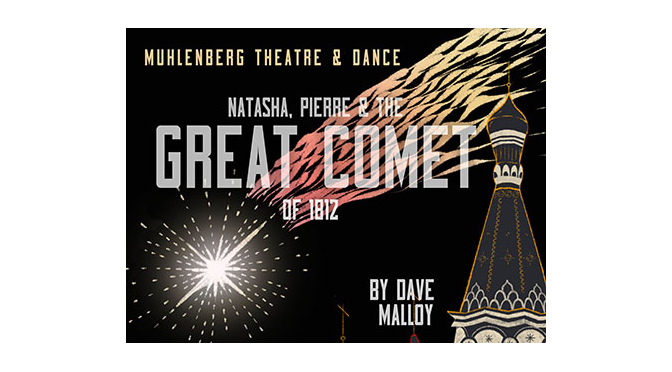|
|
‘War and Peace’ in the Nightclub
Tony-nominated musical ‘Natasha, Pierre & The Great Comet of 1812’ comes to Muhlenberg stage, Oct. 31 – Nov. 3
Allentown, Pa. (Oct. 14, 2024) — “War and Peace,” Leo Tolstoy’s 1,000-page 19th century Russian novel might conjure up memories of high school English class — but “Natasha, Pierre & The Great Comet of 1812,” Dave Malloy’s musical adaptation of the novel, is more likely to transport you to a Russian nightclub on Tolstoy theme night. At least, that’s how director James Peck envisions the musical — coming Oct. 31 – Nov. 3 to Muhlenberg College.
“This show offers the chance to watch a musical do something you didn’t necessarily know a musical could do,” Peck says. “It incorporates an incredible range of stylistic influences, from Russian folk music to electronica, contemporary pop to opera recitative. The way he juxtaposes those influences, at some level it shouldn’t work. And yet it 100 percent works.
“And who would have thought of ‘War and Peace’ as the subject matter of a musical?”
Malloy’s “Great Comet” focuses on just a 70-page sliver of events from the original novel. While its source material may be intimidating, dramaturg Rowan Joyce says not to worry. “Malloy intentionally crafts the prologue to give you everything you need to know,” she says. “I think good theatre is meant to be approachable, and ‘Great Comet’ really leans into that.”
“Great Comet” centers the two title characters: miserable, philosophizing Pierre, and young Natasha, who has arrived in Moscow to await the return of her fiancé Andrey from the Napoleonic wars. Bewitched by the glitz and glamor of high society, Natasha falls hard for Pierre’s friend Anatole, and the ensuing scandal changes both of their lives forever.
Scenic designer You-Shin Chen incorporates circular platforms and orbital shapes to pay homage to the great comet itself — visible in the night sky for more than eight months in 1811 and 1812 — as well as the musical’s two title characters. “I was intrigued by the idea of Pierre and Natasha as a dual star system,” Chen says, “their lives and how they intertwine, their certain degree of separation, and how things bring them together.”
“Great Comet” boasts complex character relationships, family trees, and connections — but the duo that centers the show is Natasha and Pierre. In each of the characters’ respective isolations from their broader Russian society, they find solace in each other.
“It’s the idea that somebody is always going to be there for you,” says Maddie Ciliento, who plays Natasha, “even when it seems like every single ounce of hope is completely lost.” Samuel Roter, who plays Pierre, offers a similar sentiment on Pierre’s reliance on Natasha. “Even at your lowest of lows, you can still find your way out,” Roter says. “There are people out there who will support you.”
For Peck, the primary antagonist of “Great Comet” is the ensemble and their mob mentality toward the main characters. “The ensemble is pretty malevolent towards Natasha, and to a lesser extent, Pierre,” Peck says. “Anatole acts as a malevolent force of the play, but he is the point of the spear of the ensemble as a whole.”
Anatole lures Natasha away from her fiancé, Andrey, for nefarious purposes. “Anatole has no morals,” Ciliento says. “As soon as Natasha meets Anatole, a little bit of that rubs off on her.” Luke McIntyre, who plays Anatole, expands upon the character’s villainy.
“Anatole represents the high society character who has been told all of his life how great he is,” McIntyre says. “He represents the idea that men can get away with anything.”
But beyond the societal stakes, seduction, and schemes, “Great Comet” is also deeply invested in what lies beyond this small Russian society. Or, as Adrián Padrón-Curet, co-dramaturg, says, “There’s a whole universe out there.” At the end of the musical, the cosmos comes into focus, providing a broader scope of the world beyond Moscow. Peck sees the comet streaking across the sky as a moment of clarity for the characters. “Redemption is possible,” he says, “even for you.”
“Natasha, Pierre & The Great Comet of 1812” runs Oct. 31 through Nov. 3 in the Empie Theatre, in the Baker Center for the Arts at Muhlenberg College. Showtimes are Thursday through Saturday at 8 p.m., Saturday and Sunday at 2 p.m. Public tickets are $20. Youth tickets and tickets for LVAIC students, faculty and staff are $8. Tickets and information are available at muhlenberg.edu/seeashow or 484-664-3333.
Content Advisory: “Great Comet” features content that may not be suitable for all patrons, and viewer discretion is advised. In particular, the play includes references to mental illness and attempted suicide, depictions of excessive alcohol consumption, predatory masculinity, gun violence, and use of ethnic slurs in reference to Romani people.
—30—
Muhlenberg offers Bachelor of Arts degrees in theatre and dance. The Princeton Review ranked Muhlenberg’s theatre program in the top twelve in the nation for eight years in a row, including a No. 6 ranking in 2024, and Fiske Guide to Colleges lists both the theatre and dance programs among the top small college programs in the United States. Muhlenberg is one of only eight colleges to be listed in Fiske for both theatre and dance.
Information provided to TVL by:
Scott Snyder







